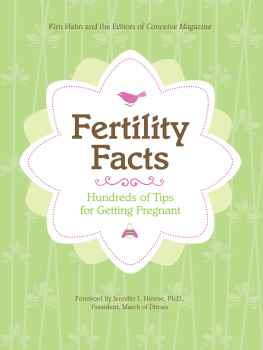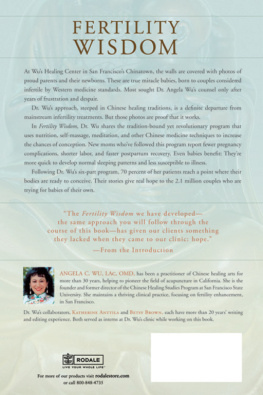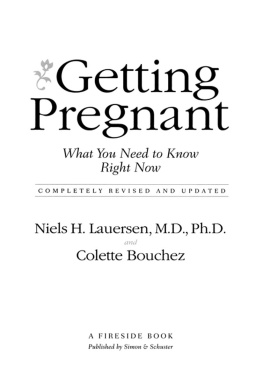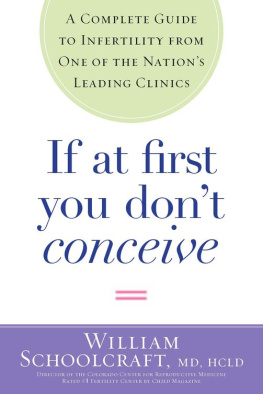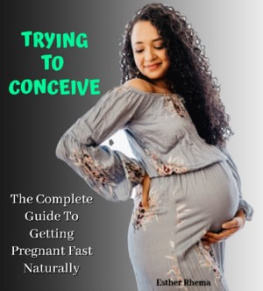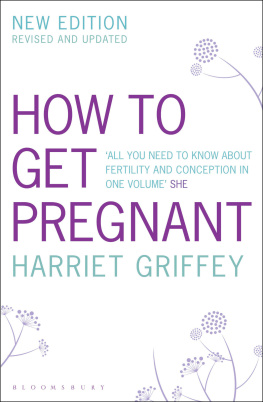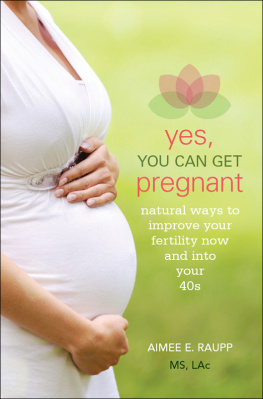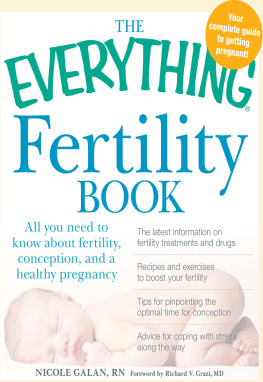
For many couples, getting pregnant is easy. For many others, it takes a bit longer than expected. And for some, it may even require medical help. For all of these peoplein other words, for anyone hoping to become a parent of a healthy babyknowledge can be the key to success. Knowing how your reproductive system works, why preconception health is so important, and what changes you can make in your lifestyle to increase your fertility will help couples at any stage of the journey. Small changes can sometimes make the difference between success and another month of trying.
At the March of Dimes, our mission is to help women have healthy babies, and we believe that one of the most important steps toward that goal is preparation, which includes education about fertility and pregnancy. That's where Conceive Magazine and its new publication, Fertility Facts, come in. It's never too earlyor too lateto learn more about the process of conception and pregnancy. In this new book, Conceive shares easy-to-understand information about many of the issues that can potentially affect fertility, for better or worse.
It's also a good idea to develop a reproductive life plan, which simply means that couples should discuss ahead of time if and when they want to get pregnant. The March of Dimes finds that having a timetable helps women and their partners get as healthy as possible before pregnancywhether that means quitting smoking, losing weight, or any other lifestyle or health changein order to have healthier pregnancies and babies. To create such a plan, make an appointment with a health care provider. Fertility Facts provides valuable information about the preconception checkup and what should be discussed. You can also find more information at www.marchofdimes.com and www.nacersano.org (our Spanish-language site), including important issues to consider concerning fertility treatments.
Learn the facts about fertility before you begin trying to get pregnant, and then continue educating yourself once you've conceived. Fertility Facts and the March of Dimes will provide you with all the information you need to sort through the latest medical and scientific research, and take charge of your healthy lifestyle. Those are the best things you can do to achieve pregnancy and give your baby a full and healthy nine-month start to life.
Jennifer L. Howse, Ph.D.
President
March of Dimes
The Preconception Checkup
The March of Dimes recommends that women ask their health care providers the following questions at a preconception checkup, and discuss these issues before trying to get pregnant.
- Do I have any ongoing health conditions such as diabetes, high blood pressure, lupus, or heart disease that need to be better controlled before pregnancy?
- Are my vaccinations and immunizations for infections like chickenpox, measles, mumps, and rubella up to date? Do I have any current infections that need treatment?
- Am I at increased risk because someone in my family had a baby born before 37 weeks?
- Will any of the medications I'm taking hinder conception or pose a pregnancy risk?
- Do I have any bad habits, such as smoking or excessive drinking, that may pose a risk to pregnancy, and how can I get help to quit?
- How can I reduce the stress in my life, or learn to handle it better?
- How can I improve my diet and nutrition?
- Should I begin taking a multivitamin containing 400 micrograms of folic acid every day, or even a prenatal vitamin?
Everyone knows how babies are made, right? The truth is, most people just know the basics. Way beyond the birds-and-bees talk from parents, and far further even than high school sex ed is a world of information about human reproduction and how it works, why it sometimes doesnt, and what can help.
In fact, fertility is something most people take for granted until they decide its time to start a family. And then, suddenly, all the lifestyle decisions made earlier in life become relevant in a new way. Diet, exercise, sexual practices, and medical history all play a part in determining whether the journey to parenthood will be a straight path or a route with many detours.
Reproductive health is often a reflection of general health. But, as with so many health issues, its just not that simple. After all, it takes two to make a baby. So one member of a couple may be in tiptop reproductive shape, but if the other isnt, there can still be challenges conceiving. Sometimes minor health problems that would have remained hidden forever, because they have no symptoms, become a factor. And sometimes its impossible to determine why its so easy for some people to get pregnant, and more of a long-term project for others.
The 250 facts in this book are not exactly secrets, but theyre not widely known, either. For instance, did you know that cell phones may affect fertility? Soybeans? That women who drink whole milk rather than skim have a reproductive advantage? That biological clocks dont just tick the years, but the seasons, too? These are just a few examples of the hundreds of fascinating facts that fill this book. The information is drawn from a wide variety of sources, including scientific journals, government statistics, medical experts, and alternative practitioners.
The book is divided into ten chapters, each with its own theme. All of the chapters include a mix of important, fun, serious, and interesting facts. The first nine chapters deal with basic reproductive function, diet and exercise, vitamins and supplements, and other information that ranges from basic to esoteric, but probably wasnt taught in high school health class. And almost all of the facts include a recommendation that can help couples use the information to maximize their fertility and get pregnant faster. Armed with this knowledge, couples will know everything they need to know to speed up their own journeyand theyll also know how to recognize when its time to get help from an OB-GYN or reproductive endocrinologist.
Since 2004, Conceive Magazine has been keeping tabs on every aspect of fertility to help couples achieve their dreams of starting or expanding their families. The magazines reporters have tracked down the biggest medical experts and interviewed nurses, doctors, scientific researchers, psychologists and life coaches, practitioners of Traditional Chinese Medicine, egg and sperm donors (and recipients), and more. Conceives writers have sifted through medical journals, analyzed data from many sources, and sometimes challenged prevailing wisdom. All to present readers with the most up-to-date and accurate information possible. Much of that information is now collected here, and presented as easily digested, logically organized, bite-size bits of information that all together provide a sumptuous meal of reproductive knowledge.
Read through from beginning to end if you like, but its certainly not necessary to consume these 250 facts in order. Check out Chapter 2 if you want a crash course in how your monthly cycle works. Skip to Chapter 8 on mens health if youre concerned about your partners fertility. Peek at Chapter 9, about sex, before you head to the bedroom tonight. (Do you think you need to lie in bed with your legs in the air after sex to maximize your chance of conceiving? Turn to page 230: you might be surprised!)
These facts pack volumes of information in easily digestible bits that will make you feel informed, but not overwhelmed. As you read, remember the vast majority of couples who want to start a family will be pregnant within the year. For those who arent, medical science now offers an arsenal of treatments, both high- and low-tech, to help. The subject of Chapter 10, the final chapter, is assisted reproduction and other fertility treatments. For couples who are concerned that their journey is taking longer than they expected, this chapter provides explanations of what may be happening to prevent pregnancy, and what can be done to overcome the obstacle.
Next page
